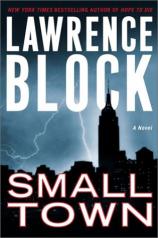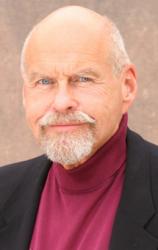Small Town
Review
Small Town
Every so often, you stumble across a book that succeeds so well on
every conceivable level that you feel like you're going to have to
give up reading for a while. You still want to read, but you
realize that, if you pick up another book immediately, or in a day
or two, or a week later, you're going to compare it unfavorably and
unfairly to the book you just read. So here is fair warning: read
Lawrence Block's SMALL TOWN, but once you finish it, plan on doing
something else for a few days.
The small town to which Block's title refers is New York City, post
9-11 New York City, a city bent but not broken, damaged but not
destroyed, changed but not transformed. It is a city that Block
loves and, equally as important, knows and understands on an
intimate basis. His title demonstrates this; it is one of the
city's many conundrums that, while you might not know your next
door neighbor, there are in all likelihood only a couple of degrees
of separation between the two of you. Block uses this kismet of
happenstance, and many others, to great and enthralling advantage
here.
Those who come to SMALL TOWN expecting a crime novel will find it
both more and less than that. It is a crime novel in the sense that
murder is committed. It is a suspense novel in that the murderer is
at large, is continuing to kill and must be caught. It is a romance
novel, of the heart and of the mind and of the person and of the
place. It is also, and not the least of these, an extremely erotic
novel. The thought came unbidden to me at one point that Block
writes extremely well while typing with one hand. There is
something here for everyone who loves good writing.
Heartbreak is often the well from which the best art springs. Here
too, the obvious inspiration for SMALL TOWN, in its execution as
well as the implicit and explicit motives of its key players, is
the 9-11 attack. The events are set in motion by Jerry Pankow, a
recovering alcoholic who discovers the corpse of his employer,
Marilyn Fairchild, a real estate agent who was last seen in the
company of John Blair Creighton, a marginally successful novelist
for whom the edges of fiction and reality often blur. Creighton is
obviously suspect Numero Uno in Fairchild's murder.
The reader soon knows more than the police on this account, but by
the time the police come to realize they may be wrong, Creighton's
newfound notoriety affects him in ways that neither he nor the
public could reasonably have anticipated. While the reader journeys
with Creighton through his ordeal, introductions are made with
Maury Winters, Creighton's delightful defense attorney; former New
York City police commissioner Francis Buckram, who is about to
undergo two of the most bizarre experiences of his life; and the
utterly unforgettable Susan Pomerance, the improbable erotic nexus
between Creighton, Winters and Buckram, who indirectly provides the
key for solving the murder of Fairchild, as well as others. SMALL
TOWN also introduces an individual who is arguably the most
sympathetic monster in literature since Shelley presented
Frankenstein's creation.
Block also drops factoids about New York City along the way, in
much the same way that you might tell a friend about a longtime
lover. The reader of SMALL TOWN will also come away with an
understanding and an appreciation of how a book is written and how,
God forbid, it is published. That account is almost as fascinating
as the spellbinding tale of who killed Marilyn Fairchild and many
others --- and how and why. As to the why, the reader will
understand. Not approve, mind you, but understand.
SMALL TOWN is so good --- so perfect --- that, upon completing it,
one almost wishes they hadn't read it, so that they could have the
pleasure of reading it again for the first time. It is, however,
wonderful a second time through and one suspects will be just as
good the third, the fourth and the fifth. Reserve a shelf for this
one, all by itself. Highest possible recommendation.
Reviewed by Joe Hartlaub on January 23, 2011





